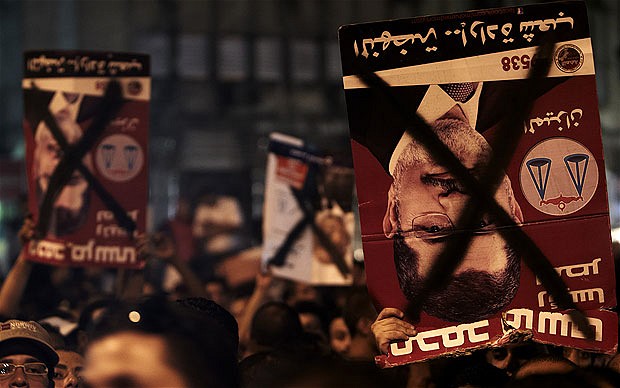By: Ashraf Ramelah
Voice of the Copts

Egyptians Protest
Egypt’s President Morsi spoke to the Egyptian people for two hours and 40 minutes Wednesday evening (June 26) demonstrating his deep resolve to keep his power and position at all cost. Predictably, his speech held little wisdom in recognizing his differences or his willingness to work toward rectifying them through compromise. Instead, the ruler of Egypt veiled his eyes to the real needs of his fellow countrymen and their pursuit of freedom and human rights.
Referring to his executive office as a “regime” and exploiting the Taquiya (deception) principle of Islamic doctrine, Morsi claimed that Egypt’s new constitution is a democratic draft (“We succeeded in writing a democratic constitution”) and pleaded with the country to honor its sovereignty. Deception by a leader is always harmful, but Morsi seems to believe his own lies, which is even more troubling. Suffering from both denial and delusion, Morsi’s mind appears to be unsound.
Speaking from his podium in the Egyptian Center for Conferences to a packed house of admirers, Morsi sounded much like an Islamic preacher addressing worshipers but, later in his speech, tempered his tone using language more like the political-religious leadership he is. This shift of method and terminology by a true Islamist illustrates a classic mixture of political aims colored with Allah-fearing sentiments to capture sympathy and agreement from listeners. The majority in the room stood up cheering and applauding for Morsi with slogans favoring the president at various times throughout his speech especially when Morsi attacked his opponents, rivals and critics.
Morsi used this singular occasion, intended for calming the Egyptian people before June 30th and urging reserve and respect, to instead name names of sitting judges who he claims to have witnessed committing fraud. A day after hearing Morsi’s comments, the judges promised to initiate a lawsuit against him for defamation of character. Morsi also pointed his finger at the few courageous journalists in Egypt openly critical of his government saying, “This is wrong, this is not acceptable.” Morsi boasted of Egypt’s free press forgetting to mention that he ousted 150 journalists early in his term and replaced them with his loyal followers.
A paranoid Morsi recalled an incident at the beginning of this year when one Egyptian TV journalist interviewed Ahmed Shafiq, former Prime Minister under Mubarak and Morsi’s opponent in the 2011 presidential election (also former military now living outside Egypt). Morsi accused the reporter and Shafiq, Morsi’s foe, of having malice for the country and inciting threats against his Presidency in a conspiratorial plot to destabilize Egypt. Morsi considers Shafiq an enemy and wants to keep him close.
Protecting a weakening and shaken regime, Morsi waxed encouragingly to his Muslim Brotherhood supporters and their militia and condemning Egyptian freedom-fighters with this statement, “one year’s enough to let the people do what they want.” As he continued to reprimand Egypt’s political dissenters he added a self-congratulatory rant about his clean record at sentencing no one to prison. However, this must have served as a reminder to his audience of his own incarceration and current fugitive status well known already to the Tamarud (Rebel) movement ready to dethrone him.
In his 11th hour attempt to assuage the opinions of millions who malign his year in office and oppose further opportunity for him to bring Egypt to ruin, Morsi stressed peaceful demonstrations as part of Egypt’s democratic society hoping to deter violence from demonstrators who already proclaim non-violence. With this, Morsi’s goal was to maintain the imbalance of forces lining up for a potential clash as an armed and ready militia now has his back. Less than 24 hours later, the Tamarud response to all this was to employ a symbolic gesture – applying padlocks and chains to the gates of official government buildings and ministerial offices and sealing them with a stamp stating, “Closed by revolutionaries.” Tamarud activists request as well that government employees abstain from work and join them in acts of “civil disobedience.”
Underestimating freedom-fighters as naïve, Morsi blamed the former Mubarak regime for his failures. He added that the burden of Egypt’s huge debt inherited by him created an obstacle for him to go forward with his plan. But he has never spelled out a plan to the people and never completed his list of actions presented earlier to do in his first one hundred days of office – things like cleaning the streets of garbage and supplying ample electricity. In fact, Morsi used this very speech to call upon all Egyptians to conserve Egypt’s electricity in their daily habits — a bleak prospect for citizens already stretched to their limits.
Juggling sarcasm and threats with mockery and attempts to cajole, Morsi’s hypocrisy was the glue that held his speech together. While praising law enforcement he emphasized his role as their Commander-in-Chief but didn’t bother to announce the formation of an Islamic religious police force in progress that will function independent of the state police. Morsi boasted that all Egyptians are equal under the law. However, Copts, Baha’i, Shia Muslims and other non-Muslims have very few rights compared to Sunni Muslims and suffer oppression, discrimination and persecution on a regular basis.
In a speech directed to his fellow Egyptians and not targeted to heads of foreign states, Morsi took a moment to thank the Prince of Qatar for doing so much. This is the equivalent of President Obama stopping in the middle of a State of the Union speech and thanking his major campaign donor for getting him elected.
In essence, Morsi’s speech constituted a major challenge to the will of the Egyptian people who will respond on June 30th, the President’s one-year anniversary.
















